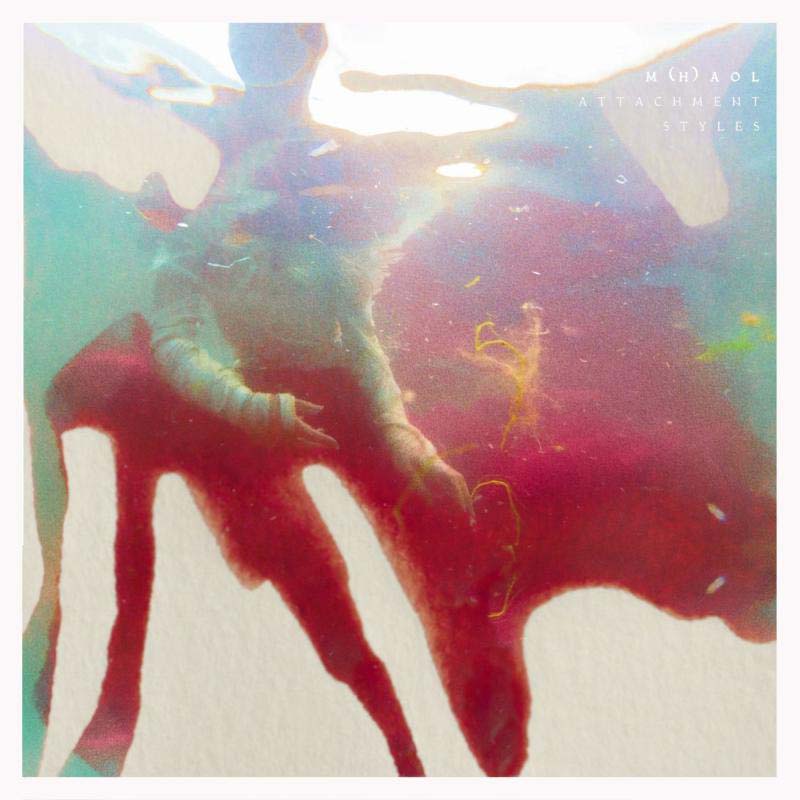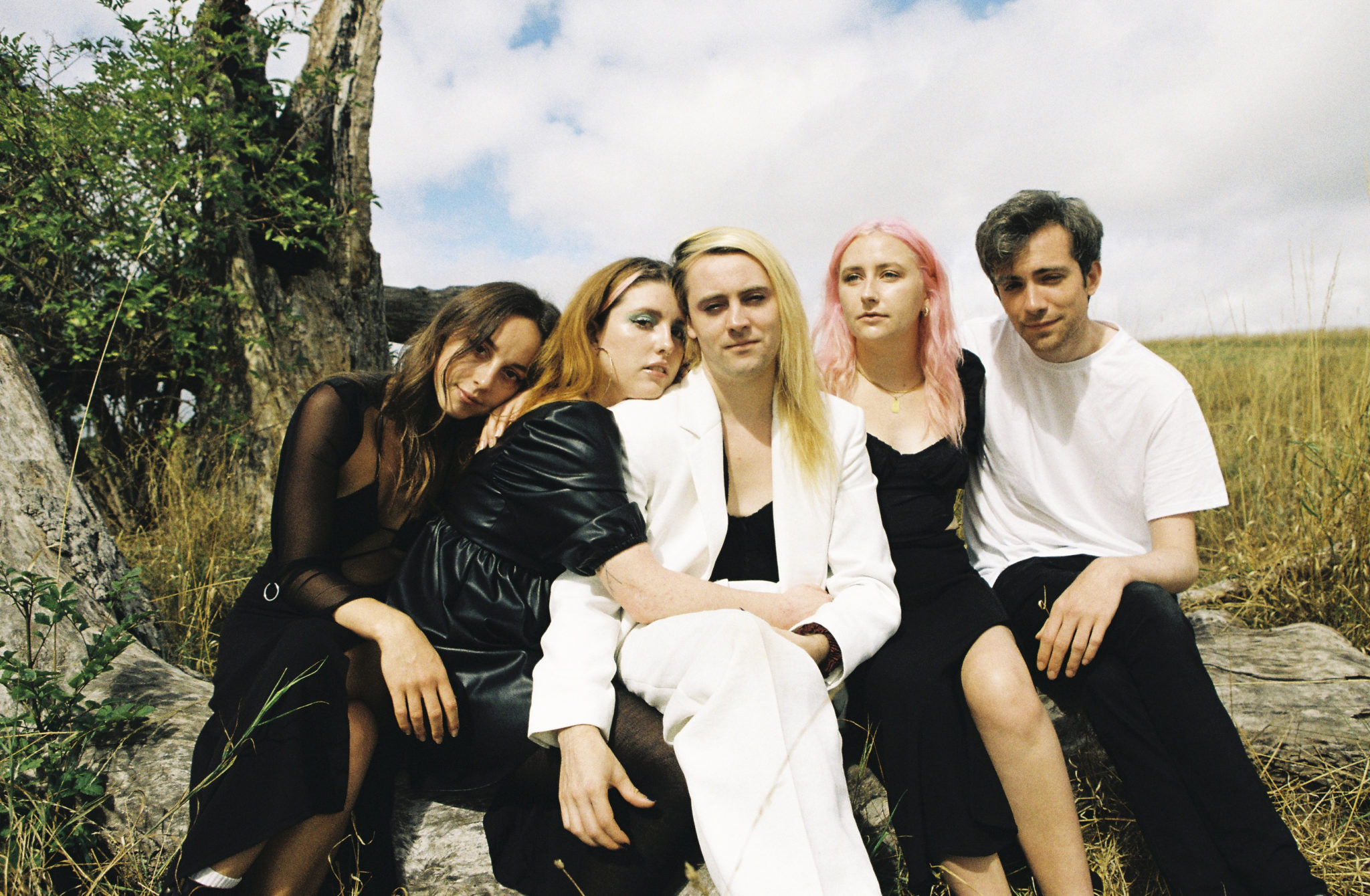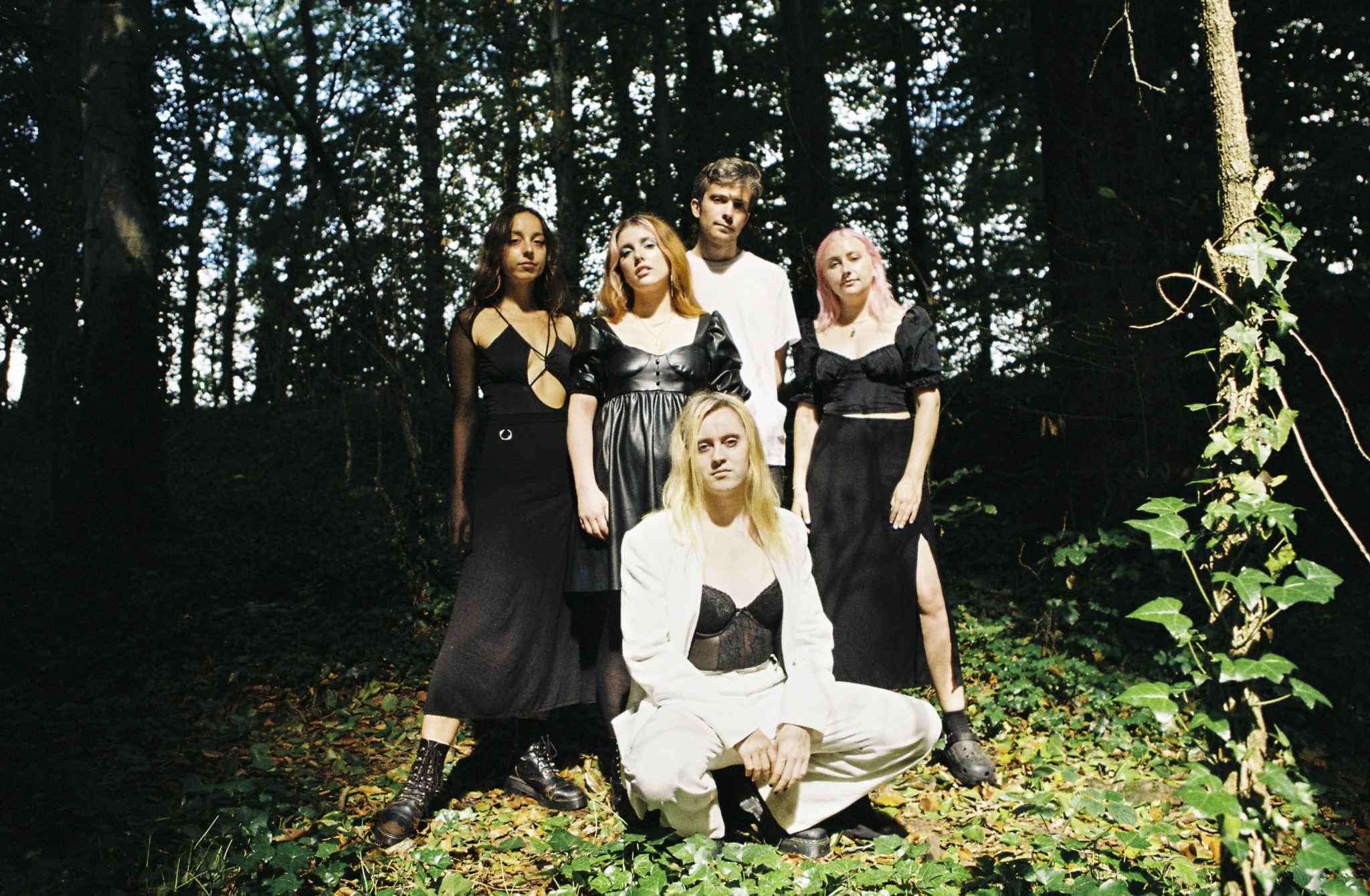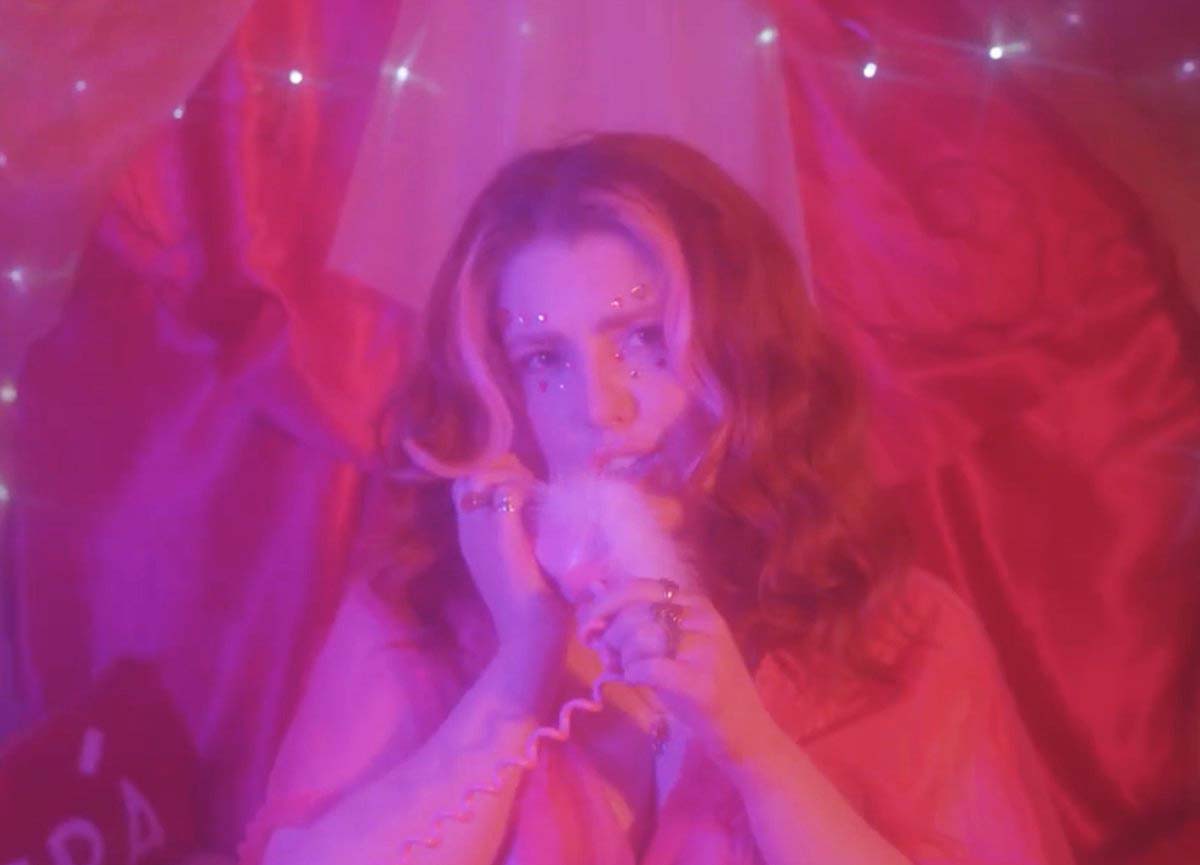- Opinion
- 27 Feb 23
M(h)aol: “We open the album with ‘Asking For It’ because many cultural narratives paint rape as the end of someone’s life. There’s no narrative around healing"

Trailblazer quintet M(h)aol on their debut album Attachment Styles, overcoming trauma, period sex, multifaceted feminism, the dark but ever-evolving history of the new Irish state and more. Bear in mind there are mentions of sexual violence throughout. Dublin Rape Crisis Centre 24-hour national helpline: 1800 778 888.
The first time I heard M(h)aol’s music was when I was shown the black-and-white video for ‘Clementine’ in 2015, featuring frontwoman Róisín Nic Ghearailt signing the lyrics to Jamie Hyland; projections of past feminist movements interspersed in the background. “A wish for rights, a worthless fight,” she declares on the single, which featured a cameo from Gilla Band’s Dara Kiely. In early February 2020, ‘Clementine’ landed on Spotify, following the band’s hiatus as they found themselves residing in multiple different cities around the world. The lives of each member evolved drastically during those years, as it tends to do in your twenties.
The second time M(h)aol’s sound flooded my ears was in 2020, when the quintet stopped me in my tracks on a Covid lockdown power walk with their brooding standalone single ‘Laundries’. “The shame of those houses with windows of steam / And the shame of those sheets that came out so clean,” Róisín Nic Ghearailt declared above a tense guitar riff, immediately gripping the listener with the chilling horrors of ‘Mother and Baby Homes’, the last of which only closed in 1995. The track’s newer lyrics, having initially been written around 2015, also tackle Direct Provision.
Here was a band that was tending to the fire felt by many around the Yes Equality and Repeal the 8th campaigns, which led to hard-fought changes through 2015 and 2018 referendums. Fast forward a year, and M(h)aol’s Gender Studies EP was out in the world. Watching them support noise heroes Gilla Band at the National Stadium last December, their connection to each other as a group was a stronger bond than I could put words to.
M(h)aol originally formed nearly a decade ago when Connie Keane and Róisín Nic Ghearailt created a feminist society at DIT, reportedly called X Why? (as in, XY chromosomes). Nic Ghearailt in particular was inspired by The Punk Singer, a 2013 documentary tracing Kathleen Hanna, who fronted the bands Bikini Kill and Le Tigre. Armed with a shaved head and Keane’s knack for band management, the foundations were laid before lyricist Róisín relocated to Brighton. M(h)aol’s drummer would go on to start electronic project Fears, later releasing debut album Oíche in 2021.
The pair initially tapped Orla Ní Dhubha as bassist prior to Jamie Hyland - who Gilla Band named Holding Hands With Jamie after due to her production gifts - guitarist Seán Nolan and visual artist, bassist and later filmmaker Zoë Greenway as a second bassist in 2020. Having been based in Dublin until 2016 when Róisín and Zoë moved to New York and Connie moved to Belfast, M(h)aol reunited for a MASI fundraiser gig in 2020.
Our first conversation takes place in the back of a van (virtually - they didn't kidnap me) after their ESNS performance and a few days before Attachment Styles lands via Connie Keane’s own TULLE Collective label.
 Artwork by Zoë Greenway.
Artwork by Zoë Greenway.
Nevertheless, they managed to enjoy themselves. M(h)aol, though adept at making unapologetically observant statements about the heteronormative, patriarchal society we live in, are undeniably fun to be around. Each piercing, defiant sentence that shines a light on trauma, gender, sex and everything in between is followed by witty quips and explosions of laughter. It’s symbolic of the fact that M(h)aol as a band and as individuals can’t be summarised by genres, tropes or simple classifications alone.
Part of the reason why Róisín Nic Ghearailt’s lyrics can floor you is likely the same reason why she can make those around her laugh; blinding, unabashed sincerity. M(h)aol never use any words they don’t mean.
“It’s been a long time since I’ve been in a youth hostel!” Róisín declares, sitting on the ground of the reception couches for our second interview.
“The Margate show last night was hilarious,” she grins. “The lineup featured a screening of Kathryn Ferguson’s documentary Nothing Compares, about Sinéad O’Connor. Then a Q&A with Emma Dabiri and Ferguson: very exciting so far. It said ‘and Irish punk band M(h)aol’, but there was no reminder that we were playing at the end. By the time we went on stage, there were probably about eight people in the audience. One of them was Kathryn, one was Emma Dabiri. The rest were bar staff, Connie’s aunt and two punters. Everyone loved it!” Róisín exclaims.
Once everyone there enjoyed it, do the numbers matter?
“That’s the spirit, Kate,” she replies, unphased. “We’ve definitely had a run of shows and experiences that have been new and…skin-thickening.”
“We released our latest single ‘Period Sex’ today, and my friend wanted to play it on BBC 6 Radio, and they cut out the heavy breathing and took ages to approve it,” Róisín informs me. “That controversy is also new for us.”
The visuals for ‘Period Sex’ appears to be shadowbanned on platforms like Instagram, while Twitter added a content sensitivity warning.
“I mean, some of the fruit fingering is pretty erotic,” Róisín smiles with a shrug. “But you can go on Playboy’s Instagram account and see absolutely everything out there.” The word ‘cervix’, a biological term that doesn’t have sexual connotations, is still edited out of songs for radioplay, in 2023.
Having read the extensive coverage around Attachment Styles in both the UK and Ireland, there’s an odd disparity between publications either asking emotionally charged questions around their powerful 2022 single ‘Asking For It’, while others appear to ignore sexual assault and its aftermath.
“It’s interesting, because when someone starts that line of questioning, you wonder how delicately they’re going to ask the questions and how well they’re going to understand responses,” Jamie offers. “How well will they translate that into text within a word count? What’s the intention?”
“This is the first thing we’ve ever done that has gotten a lot of press coverage,” Róisín stresses. “Thematically, we spoke a lot about how Irishness has informed our music, how changes in the country impacted it, and none of that was included. We just felt like people focused on the Netflix biopic, flashy series aspect of M(h)aol.”
Would this album have the same poignancy if it had been released around the time of the 2015 Marriage Equality or 2018’s Repeal campaigns?
“It’s no less necessary now than it was back then,” Jamie responds after a few seconds. “Hopefully it won’t be as urgent in the future.”
“It’s like stepping stones,” Zoë says. “Those things happening created a culture where we are more comfortable expressing these opinions, experiences and ways of healing. If there was just a lot of pushback, it would have been disheartening. It might have been received differently.”
“Absolutely,” Róisín affirms. “The reality is that M(h)aol as a band wouldn’t have made this at that time. We formed in 2014, and Marriage Equality was 2015. You have to be confident enough to play songs that people have such a reaction to, one way or another.”
“Or skilled at expressing them,” Zoë tacks on, softly. “The album is a journey of discovery,” Jamie explains of their path.
“Repeal and the Marriage Referendum have created a landscape in which it is possible for people like us to make this music, and possible for loads of different bands to pay greater homage to our history,” Nic Ghearailt urges. “A lot of people were so dismissive of modern Irish culture, and this has softened their reaction to it. It’s a good thing to be Irish, we’ve changed. We’re not just pain and oppression - and before that, colonialism and failed promises. I often think about how exciting it is to be from such a recent nation state. We’re not such an old country like England where the weight of history is bearing down on them. As a new republic, we can evolve.”
 M(h)aol by Naomi Williams.
M(h)aol by Naomi Williams.Do M(h)aol feel as though the burden of representation and responsibility is on their shoulders to educate others on topics spanning all of intersectional feminism; sex, patriarchy, racism, transphobia and beyond?
“I don’t feel like we’re talking about politics, it’s just talking politically about important topics. I don’t know if there’s much of a real distinction there, but there is for me,” Jamie says, slowly.
“What we’re talking about in interviews and onstage is an amplification of literally what we talk about all the time with each other,” Róisín continues, passionately. “What makes it such a successful, united band is that there’s no distinction between politics and non-politics; it’s about living an ethical life with a political mind. In terms of being asked about traumatic subjects, most interviewers don’t want to discuss the singles ‘Asking For It’ or ‘Period Sex’ because the topics are too hot to touch. We want that conversation.”
“If ‘Asking For It’ helps someone hear about that experience and know that they’re not alone, that’s the point. Same with ‘Period Sex’; it’s about fighting against shame,” Greenway nods.
“I’m just the dumb bitch that left the party with you / Was I asking for it? / Did I ask for it? No!” Róisín rawly declares in the latter half of the song.
“Nowhere, really, do we talk about gender in ‘Asking For It’ and ‘Period Sex’. It’s not just about women,” Nic Ghearailt tells me. “I made sure in the lyrics that I don’t say ‘woman’ or ‘female’. Not only women get periods, but it’s also about people who get periods and their partners. If you love someone, wouldn’t you want them to be having great sex? Yet in so many publications, they refer to ‘Period Sex’ as an ode to female desire. Yes, I’m a cis woman, but the lyrics are about everyone. Men, women, non-binary people. That is something we tried to do. Unless it’s a song like ‘Bored of Men’, I try not to make it gendered, because it’s not. It’s a spectrum of beliefs that fall into the realm of masculine or feminine, and patriarchy.”
The beautiful Kinsale-filmed ‘Asking For It’ video, released last November, is chilling yet cathartic, emblazoned with horrifying statistics about rape culture and Ireland’s failing criminal justice system while allowing Nic Ghearailt to scream into the camera, the waves acting as a final relaxant for overcoming trauma and the release which comes with moving on.
“It felt like it needed to be said in a way that it hadn’t been said before,” Zoë offers. “There are ways of supporting someone by making these statements. Anyone watching it can’t help but be moved because Róisín’s performance is so breathtaking. Paired with the statistics, you can’t argue with what she’s saying here. The facts are in front of you, as well as the emotion.”
The day of our interview, headlines are circulated that the Sexual Assault Treatment Unit had over 1000 patients last year for the first time since they began recording the data. We also have Judge Martin Nolan, who repeatedly hands out suspended sentences to men who commit unspeakable acts of violence, leading to a petition online for his dismissal.
“I really cared about how this song was going to be represented,” Greenway recalls. “I don’t want to insert myself into that really heavy thing, but I felt a lot of passion about helping other people by expressing this sensitively.
“We all had a weight over ourselves while shooting,” Zoë adds. “I initially did a completely different cut of the video that didn’t have Róisín in it, but it wasn’t what the video needed to be, so we met for a few hours to re-do it in Cork. My friends Daniella and Katie came to help. We knew it would be difficult to film it. I didn’t give Róisín any pointers, because it’s not something I can direct. I’m capturing whatever she feels when she’s saying this. I wanted to portray my own emotion visually in a way that supports her, because it’s upsetting for me to see my friend saying those words, and it’s hard for Róisín to sing them. We didn’t have a plan for that reason.”
Nic Ghearailt explains her own mindset around the visuals.
“I really didn’t want to be in the video at first, because there’s a difference between putting out a song in which you are not overtly saying, ‘Yes, I wrote this song because I was raped and that’s what it’s about - rape culture and the society we were all shaped by’,” she starts. “There’s a big difference between people listening to it on Spotify where they don’t have your face attached to it. A video is a more permanent piece of footage. It’s tangible.”
“I never want to speak on Róisín’s behalf,” Zoë assures me. The video was partially inspired by Phil Collins’ clip for ‘Another Day In Paradise’, which traces homelessness, alongside the need for resources.
“I was doing research into femicide, and it was just so heavy,” Róisín shakes her head. “Where do the statistics end?”
“Zoë never would have asked me to be in the video, but I knew I had to,” she says. “If I was ever going to say something with my chest and put a message out there, it would be with her - because it’s rooted in love. Everyone was crying when we filmed it in Kinsale, but I was absolutely fine, until the very end. There’s a scene where I fall and then Katie and Daniella come over to pick me up. Katie is trained in trauma response, and she picked me up from the sand and looked at me with such kindness and care in her face and I just burst into tears. I had the speaker in my back pocket repeating ‘Asking For It’. I was like, ‘I’m fine!’ until Katie did that.”
“We spoke a lot about rape revenge films and how they’re often not survivor-centric at all,” Greenway says, animatedly.
“We wanted to show a different mindframe for a survivor to take,” Zoe ponders. “It’s a more therapeutic route for your mental health to portray overcoming it, knowing that you’re stronger than what happened to you.”
“You heal yourself and you do heal your community and impact on the people around you,” Nic Ghearailt emphasises. “We really wanted to show that unity at the end. This is something to be enraged about, but anger on its own doesn’t ultimately achieve anything. There has to be a route out.”
“The aftercare is the sound of the ocean,” Greenway muses.
“I’m not the only person in the band who have been impacted by rape culture, as has everyone who exists in society,” Róisín jumps in. “I’m not the only person in the band who is a survivor of sexual assault. In terms of aftercare, or care around performing it, the song does come with a trigger warning. I feel like that term has become so politicised, but we let people know at a gig. I don’t always vibe with the audience so I won’t do this thing that’s very vulnerable in front of them. I need to get everyone to shake and do something communal afterwards, because it raises awareness about how emotions sit in your body. We were reading The Body Keeps The Score by Bessel Van Der Kolk at the time, so we incorporate breathing in our video.”
“It’s good to share things that encourage healing rather than only portray the cruelty of the situation,” Zoë ponders.
“It’s a hard thing to talk about, and it’s a hard thing to have gone through. This is something I’ve spoken about so much in therapy. ‘Asking For It’ is not about being raped, it’s about what trauma-informed therapists call ‘secondary wounding’ - the response to you being raped, within society. It’s also about my own response to it. Seven years ago, I was affected by people around me saying things like, ‘What were you drinking?’”
“We want to push back on the culture of silence,” the filmmaker agrees. “When people believe you, it’s an acknowledgement that offers validation.”
“It’s not just about sexual assault, it can be about any violence upon someone. Racism, transphobia. You just want someone to say ‘I’m so sorry that happened to you’,” Róisín nods.
 M(h)aol by Naomi Williams.
M(h)aol by Naomi Williams.I wanted to ask the band about Enola Gay’s single, ‘Through Men’s Eyes’, which used WhatsApp texts from the Belfast rape trial as lyrics. Some listeners felt it was deeply triggering, no matter what their intent was.
“I have no interest in seeing that because there’s nowhere near enough media and sensitive, compassionate portrayals of survivors telling their own stories,” Nic Ghearailt responds, strongly.
“It’s mostly coming from men as well,” Zoë interjects. “It’s a violent portrayal through the male gaze. We want an empathetic gaze, not necessarily gendered. How can that not inspire compassion in you?”
“If it doesn’t move you, you don’t have a heart,” Róisín nods. “The line in ‘Asking For It’, 'When I screamed in the night / I wasn’t screaming for you’ is one of my favourite lyrics I’ve ever written. It’s about how people blur the lines between sexual assault and sexuality. If you’re not attuned to what a scream of pleasure versus what non-consensual pain sounds like, you’re doing it wrong.”
Elsewhere, the seductive video for ‘Period Sex’ juxtaposes a bedroom with bodies clad in red lighting, lingerie and symbolic red liquid with an underwater scene alluding to the beautiful Birth of Venus painting by the Italian artist Sandro Botticelli. The Zoë Greenway-helmed clip takes inspiration from the work of experimental filmmakers Georges Méliès, Carolee Schneeman, Barbara Hammer, and James Bidgood. The purpose is to challenge "the dominant interpretations of sexual expression and how they use human bodies and dreams to subvert expectations."
“I was trying to show that it’s just a biological process,” Greenway notes. “The ‘No One Ever Talks To Us’ video featured blood, but where the blood comes from informs people’s fears of it. Violent blood is portrayed in movies and TV shows and everyone’s fine with it, whereas a bit of blood on sheets or tights has entirely different connotations - usually, shame.”
“You’re all shaped by this!” Róisín laughs. “You came from the womb. I felt really strongly in terms of creating a narrative on the album. I wanted to open with ‘Asking For It’ because so many cultural narratives paint rape as the end of someone’s life. There’s no narrative around healing for sexual violence survivors, and it’s the same for things like the Magdalene Laundries. Even the Blackrock scandal around clerical abuse. It’s so important to cover these stories but there has to be some message of hope. There’s still so little in our society centering the survivor in any situation. I wanted Attachment Styles to close with something absolutely shameless!”
 Still of Róisín Nic Ghearailt in the video for 'Period Sex', by Zoe Greenway.
Still of Róisín Nic Ghearailt in the video for 'Period Sex', by Zoe Greenway. “Outrageous!” Zoë laughs.
“And for Irish women to be on the record saying, ‘Guess what? You think we’re repressed? We’re gettin’ freaky on our periods!’ I wanted the first verse to be me literally saying that I want to lay you down and eat you out while you’re on your period. That couldn’t have happened 20 years ago.”
“We only started using red liquid in the sanitary pad TV ads!” Zoë posits.
“It’s empowering,” Róisín adds. “In the true sense of the word, it gives you power. It’s also raunchy; I can’t make eye contact with anybody when I’m performing it!”
“With ‘Bisexual Anxiety’, I was also writing it for people less experienced than I was who were identifying as bisexual for the first time. I’m a queer woman who exists in a big bisexual community in Bristol. All of my housemates and nearly all my friends are bisexual. It’s like a big bi mafia,” Róisín jokes. “The poem is almost like an act of compassion.”
There’s plenty of tongue-in-cheek lines and humour on Attachment Styles, don’t be fooled by their ability to vocalise extremely heavy subjects.
“We’re already doing things our own way in the studio, because of Jamie,” Nic Ghearailt states. “It’s special to us all, because we’re creating a bright future for us to exist in. I don’t see it as dark humour or a coping mechanism - it’s genuinely borne out of joy. What’s often overlooked in dominant culture in Ireland is that the levity has to exist alongside the shadow work or darkness. There were loads of clips from recording the album that we couldn’t include because we were laughing too much.
“Feminism is a multifaceted thing - one part is closeness. It’s about questioning historical ideologies behind the constructs we’re delving into.”
Attachment Styles is out now via TULLE.
The new issue of Hot Press is out now, starring Inhaler and The Academic.










